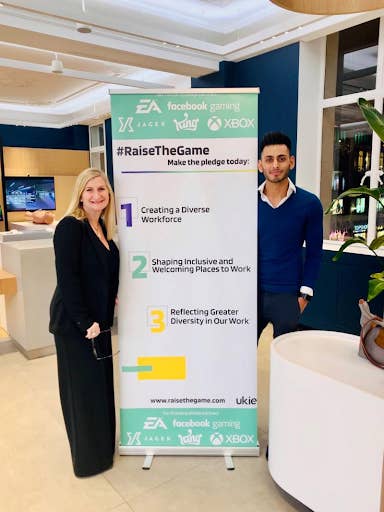Level up on diversity: Three changes to get more women into games
King's Frances Light looks into ways games companies can improve their gender balance
Games is an industry characterised by innovation and creativity -- where creating something fun and engaging is key to keeping audiences excited and coming back for more. These audiences are broad -- men and women, young and old -- yet the people behind the games are still overwhelmingly male. So how can we change this?
Embracing gender diversity is not only the right thing to do for society, but also for our businesses. Building a team of people from different backgrounds and with different experience allows for a more diverse approach and, ultimately, games that reflect the diverse audiences who play them, which is vital to a creative industry such as ours.
Encouraging women into games is important, but keeping top talent is key
It can be difficult to know where to start in getting more women into games, and no one has done all they can do. It's something we can all work together on, and that must be addressed at companies large and small for the good of the whole industry.
UKIE, the UK industry trade body, rightly recognises this with #RaiseTheGame -- an industry-wide pledge on diversity and inclusion, of which King is a founding member. It focuses on helping games companies of any size, or at any stage in their diversity journey, to make meaningful change.
We also hope that by sharing a few of the routes we've explored here at King, we can help other businesses encourage female talent and become more diverse.
1. Take a look at your recent hiring history and set targets
As a first step you should understand how diverse your business currently is. But, beyond this, take a look at who you've recently hired. Who have you brought on board in the last twelve months? How many of your new hires over this period were women? What sort of roles were they going into?
By better understanding the makeup of your recent hires, you can get a better picture of what your future requirements should be, and how ambitious your hiring targets must be. Whatever the size of your business, hiring targets are a useful way to ensure you're actively thinking about diversity when bringing in new talent.
Setting manageable targets each year is a great way to stay on track. Back in 2018, we took a look at our intake for the year. We found that only 34% of our new hires that year were women. We realised that we needed to close this gap, so we made a plan and set a target to reach 40% in 2019. We were delighted when we met this.
Following this achievement, this year we set our most ambitious target yet -- to hire a 50/50 gender balance within 2020 -- a goal we believe is a first for a games company of our size and scale.

2. Explore how you can grow new diverse talent
Employing fresh new talent is a great way to consciously hire more women. But the talent pipeline is predominantly male. Games companies must support young aspiring games developers from different backgrounds at the beginning of their careers or before, starting with those in school and university.
One of the ways we've done this is by becoming a founding partner of Ada, the National College for Digital Skills. Ada was set up to plug the digital skills gap and create pathways into high tech jobs for people who wouldn't otherwise enjoy those opportunities.
Named after early 19th century mathematician Ada Lovelace, the college was also set up with a determination to encourage more girls and young women into digital roles. We run game jams with the students, to enable them to creatively engage with game design and marketing. With this, they have something to include in their portfolio, and they spend valuable time with members of our studio discussing their ideas.

The partnership has enabled us to support a whole new pool of future talent, and we're able to work with students to offer mentorship opportunities. For 2020, we have 13 employees in a number of different roles matched to students from Ada, offering advice and helping them to build a career in tech.
If you run a smaller studio and can make a time investment, get in touch with local educational institutions with creative and technology departments. This is a great opportunity to offer careers talks or mentoring for local students. Make valuable connections with schools, colleges and universities, and start to cultivate potential new talent that will have your studio front of mind when considering roles for the future.
Beyond this, consider setting up a targeted internship programme for students or recent graduates to encourage specific groups into the industry. A few years ago, we set up our Women in Games Scholarship, which takes several female or non-binary graduates to the Game Developers Conference (GDC) in San Francisco and offers them an internship at one of King's game studios. Many of our interns are still with us today.

3. Retaining and supporting gender diverse talent
Last but not least, take your current employees on the journey with you and make sure you have schemes in place to retain diverse talent already in the business. Encouraging women into games is important, but keeping top talent is key.
Set up a scheme to drive forward the progression of high performers. As a studio lead, work out where your top female talent lies and set out a roadmap to ensure they're supported at every stage of their career. Retaining top talent right up to senior levels provides aspirational figures in the business for new talent and shows you're serious about diversity across the board.
To accelerate women into leadership roles, we set up our Kicking Glass programme, which aims to support and provide experience and exposure for opportunities, coaching and mentoring, to all female and non-binary employees. This includes tailored modules for employees at different stages in their career, from junior to executive, as we wanted to offer something that is relevant to all. It has been a great initiative in helping to retain and support our incredible female talent.
Whether you're looking to make small changes or implement significant change at your business to improve diversity, taking a look at these three key areas is a great start.
Frances Light is the director of diversity, equity and inclusion at King. For more information on diversity in the games industry, check out the UK Games Industry Census report, published earlier this year alongside the #RaiseTheGame industry diversity pledge.